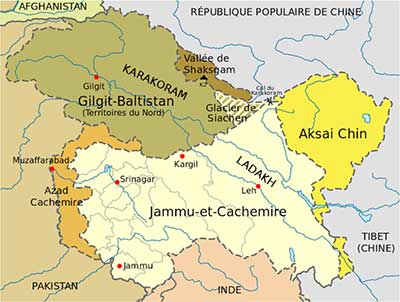Daily-current-affairs /
01 Nov 2020
Provisional Provincial Status to Gilgit-baltistan : Daily Current Affairs

Provisional Provincial Status to Gilgit-baltistan
Why in NEWS ?
- The MEA reaction comes after Pakistan Prime Minister Imran Khan announced the granting of "provisional provincial status" to
Gilgit-Baltistan.
ABOUT
- India said that Pakistan’s move to name Gilgit-Baltistan as its
fifth province is meant to “camouflage its illegal occupation”
of the area but it cannot “hide the grave human rights
violations, exploitation and denial of freedom” to the people
for over seven decades.
- The Union Territories of Jammu and Kashmir and Ladakh,
including the area of so-called ‘Gilgit-Baltistan’, are an
integral part of India by virtue of the legal, complete and
irrevocable accession of Jammu and Kashmir to the Union of
India in 1947.
- Also recently, Saudi Arabia, a key ally of Pakistan, had
removed Pakistan-occupied-Kashmir and Gilgit-Baltistan
from the Pakistan map on its new banknote after India
asked it to take “urgent corrective steps” about the “gross
misrepresentation”.
GILGIT-BALTISTAN
- Gilgit-Baltistan, formerly known as the Northern Areas, is a region administered by Pakistan as an administrative territory, and
constituting the northern portion of the larger Kashmir region which has been the subject of a dispute between India and Pakistan
since 1947, and between India and China from somewhat later.
- The territory of present-day Gilgit-Baltistan became a separate administrative unit in 1970 under the name "Northern Areas". It was
formed by the amalgamation of the former Gilgit Agency, the Baltistan district and several small former princely states, the larger of
which being Hunza and Nagar.
- After Pakistan's independence, Jammu and Kashmir initially remained an independent state. Later on 22 October 1947, tribal militias
backed by Pakistan crossed the border into Jammu and Kashmir. Local tribal militias and the Pakistani armed forces moved to take
Srinagar but on reaching Uri they encountered defensive forces. Hari Singh made a plea to India for assistance and signed the
Instrument of Accession.
- On 1 January 1948, India took the issue of Jammu and Kashmir to the United Nations Security Council. In April 1948, the Council
passed a resolution calling for Pakistan to withdraw from all of Jammu and Kashmir and India to reduce its forces to the minimum
level, following which a plebiscite would be held to ascertain the people's wishes.
- However, no withdrawal was ever carried out, India insisting that Pakistan had to withdraw first and Pakistan contending that there
was no guarantee that India would withdraw afterwards.Gilgit-Baltistan and a western portion of the state called Azad Jammu and
Kashmir have remained under the control of Pakistan since then
GEOGRAPHY
- The Deosai Plains are located above the tree line and constitute the second-highest plateau in the world after Tibet, at 4,115 metres
(13,501 ft). The plateau lies east of Astore, south of Skardu and west of Ladakh.
- The main ranges are the Karakoram and the western Himalayas. The Pamir Mountains are to the north, and the Hindu Kush lies to
the west. Amongst the highest mountains are K2 (Mount Godwin-Austen) and Nanga Parbat, the latter being one of the most feared
mountains in the world.
- Three of the world's longest glaciers outside the polar regions are found in Gilgit-Baltistan: the Biafo Glacier, the Baltoro Glacier, and
the Batura Glacier.








